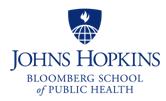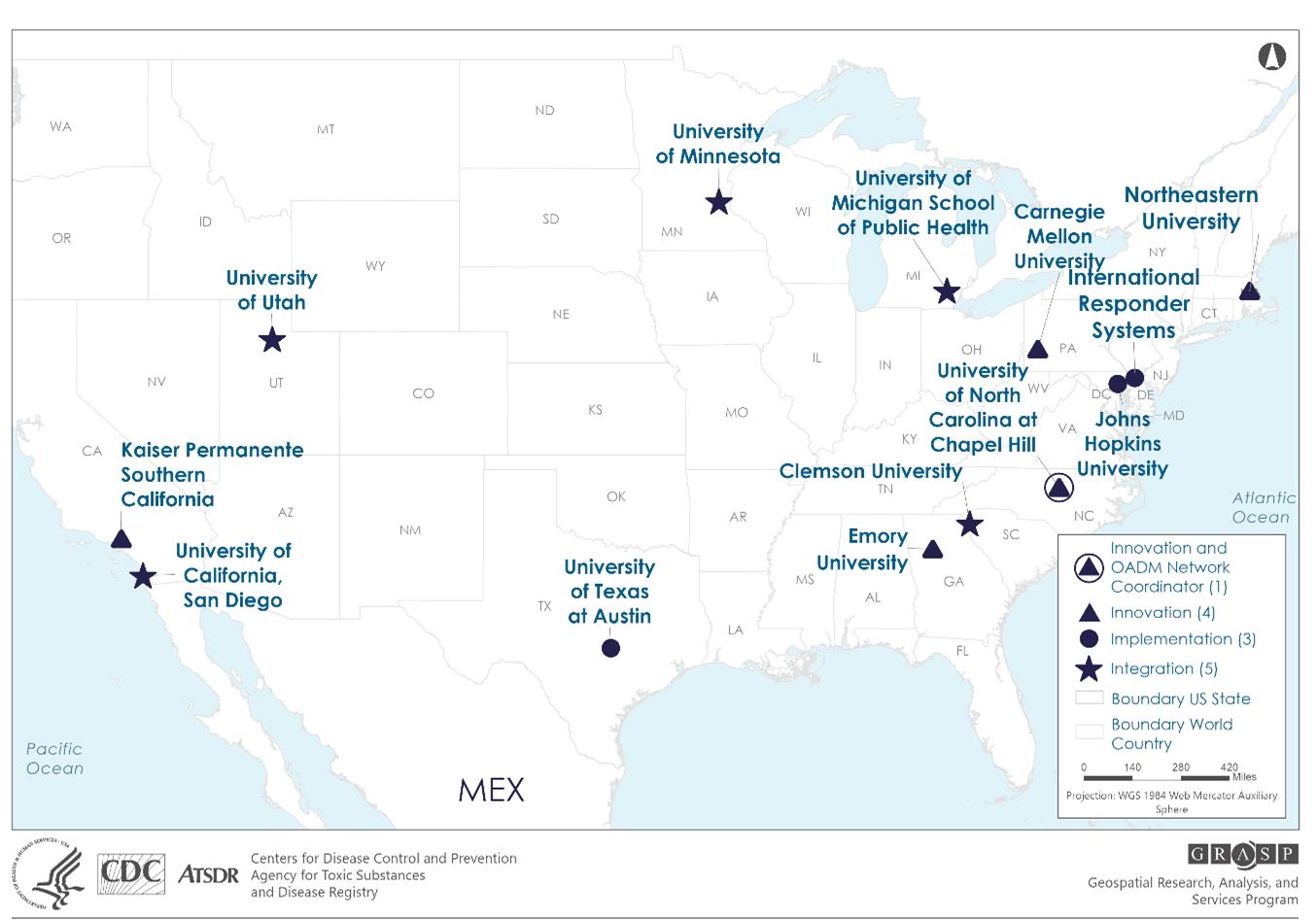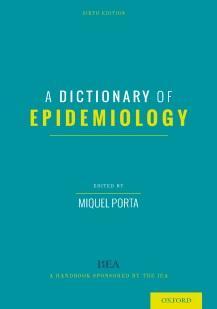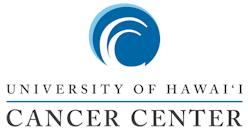Epidemiology for Epidemiologists


A monthly update covering people, events, research, and key developments

Editor’s Note:
This month, we dive into the opioid crisis, particularly how cattle tranquilizers complicate the picture and what we can do about it. This is followed by a Q&A with Nikole Allen from Yale School of Public Health about a promising new pipeline from academia to public health departments. We pull an article from the archive focusing on racism as a key causal factor in health.

We continue to provide you with Notes on People, an overview of what we read from the public media, and upcoming epidemiology events. Finally, don't miss the Job Bank offerings this month. We have some fantastic opportunities advertised both here and on our website.



Did you miss last month’s issue? Read it here: https://bit.ly/3ESwndI or here: https://bit.ly/3EVM58g
-2- Exacerbating the Opioid Epidemic
-5- Q & A with Nikole Allen
-9- Archives: Racism as a Causal Factor in Health


-11- CDC Announced Initial OADM Grants

-13- 7th Dictionary of Epidemiology
-15- Crossword
-17- What We’re Reading
-19- Notes on People
-21- Near Term Epi Event Calendar
-22- Marketplace – Jobs & Events
September 2023 • Volume Forty Four • Number Nine
In This Issue
How a Cattle Tranquilizer is Exacerbating the Opioid Epidemic
Author: Madeline Roberts, PhD, MPH
Katelyn Jetelina, PhD, MPH
Mortality data for 2022 shows that the U.S. experienced an unprecedented number of overdose deaths: 106,699 a 747% increase since 2001. It’s not surprising that the National Institutes of Health ranks opioid addiction as a top public health concern for Americans. The Joint Economic Committee estimated the opioid epidemic cost the United States nearly $1.5 trillion in 2020, which included costs for health care, criminal justice, and lost productivity.
Most recently, xylazine–an FDA-approved drug for veterinary medical use as a cattle tranquilizer–is complicating the picture. Perhaps in part because it is not a controlled substance and thus may be less subject to detection by law enforcement, xylazine has worked its way into the illicit drug supply. US Drug Enforcement Administration (DEA) lab results show xylazine is found most commonly in polydrug mixtures; the DEA describes it as an adulterant in the illicit fentanyl drug supply. Dealers are cutting illegal fentanyl/opioids with it, and the effects have been devastating. The American epicenter for a time was Philadelphia, but xylazine has now been detected in the illegal drug supply in 48 states. While the highest number of xylazine-positive lab identifications remain in the Northeast, the largest percent increase in has more recently been in the South where xylazine-positive overdose deaths have correspondingly increased 1,127% between 2020 to 2021.
the Central Nervous System—respiratory function, heart rate, and blood pressure all decrease with its use. When used in combination with opioids, xylazine increases the risk of overdose. It also can leave necrotizing soft tissue wounds truly horrific flesh wounds that are responsive to treatment, but if left untreated can require amputations or be life-threatening. Getting and maintaining proper wound care can be especially difficult for unhoused individuals.
In March 2023, the FDA approved a drug, Naloxone, used to counter the effects of opioid overdose, particularly depressed respiratory function. Often referred to by one of its trade names, Narcan, Naloxone is a nasal spray that binds tightly to the same receptors as opioids and blocks actual opioids from taking effect. It is considered so important that it’s on the WHO model list of essential medicines.
But it isn’t a magical antidote, per se. In 2020 and 2021 Naloxone was administered in around 20% of opioid overdose deaths. So, if Naloxone really is a life-saving drug, why did some people to whom it was administered still die? Three main reasons:
1. Timing is everything. Naloxone only works for approximately 30-90 minutes. If someone took a huge (or very recent) dose of opioids and it’s still circulating after that 30-90-minute window, the opioids are free to bind to receptors and take effect.
2. Administration route. Until 2015, Naloxone was only approved in
From a medical standpoint, xylazine depresses the
- Cattle cont'd on page 3
-2-
formulations that had to be injected with a syringe or auto-injector. So, when Narcan came along in the form of a nasal spray, it was a big deal. The nasal spray formulation made it much faster and easier to administer. Narcan was initially approved by the FDA in 2015 through a fast-tracked review process, but only for prescription use.
3. Availability is crucial. In 46% of fatal overdoses in 2021, someone who could have intervened or responded to the overdose was present but unable to provide life-saving measures such as Naloxone. In other words, we need Naloxone to actually be available in the critical moment. The CDC estimates that this only happens at a rate of one Naloxone co-prescription per 69 highdose opioid prescriptions.
On March 29, 2023 the FDA approved Narcan for over-the-counter (OTC) or non-prescription use. This was a big deal as it made the drug easier to obtain in times of emergency. This approval resulted in the availability of Narcan in convenience stores, gas stations, even vending machines in New York City. One big concern, though, is that availability is different from administration. An education campaign is greatly needed to increase self-efficacy the signs of an overdose, how to administer Naloxone, when, and what to do afterwards. For pricing, Emergent released a statement saying their goal is for the out-of-pocket retail price to be less than $50, which is their current charge to public interest groups like government agencies and nonprofit organizations.
Importantly, because xylazine is not an opioid, Naloxone is of no use in reversing its effects or restoring respiratory function. Administering
Naloxone is still advised in the event of overdose because xylazine is so often mixed with opioids Naloxone can counter the effects of the opioid component, but xylazine may mitigate its effectiveness.
On April 12, 2023, the Office of National Drug Control Policy (ONDCP) identified xylazine in combination with fentanyl as an emerging threat to the United States. On September 22, 2023, the DEA and the Department of Homeland Security issued a joint statement on pathways by which xylazine is entering the US, which concluded that import (from China and other countries), diversion (from veterinary drug supplies), and to a lesser degree, smuggling over the southwest border were the primary sources. China had previously placed production and sale restrictions on common ingredients for illicit drugs, however, deteriorating US-China relations are possibly implicated in a change of China’s position.
In July 2023, the ONDCP released the Fentanyl Adulterated or Associated with Xylazine Response Plan, with the stated goal of “a 15% reduction (compared to 2022 as the baseline year) of xylazine-positive drug poisoning deaths in at least three of four U.S. census regions by 2025.” The Plan outlined six action areas:
Standardization of testing and deployment in communities;
Development of a comprehensive epidemiologic data system;
Evidence-based prevention, harm reduction strategies, treatment development and deployment, and capacity building among service providers;
- Cattle cont'd on page 4
- Cattle cont'd from page 2 -3-
Source and supply identification, and supply reduction actions;
Regulatory pathways to disrupt production and distribution;

Basic and Applied Research ranging from treatment development to user motivation
There is extraordinary, encouraging work already being done in community-based programs and nonprofit settings.
- Cattle cont'd from page 3
■ -4-
Q & A with Nikole Allen
Interviewer: Madeline Roberts, PhD, MPH

Over the past few months EpiMonitor has covered several aspects of the public health workforce landscape from the post-COVID exodus to current job search challenges. We have also sought to highlight the critically important work happening in public health departments. This month, we were excited to talk with Nikole Allen from Yale School of Public Health about a promising new program that serves as a pipeline from academia to public health departments. Our Q&A with her is below, edited for length and clarity.
EpiMonitor: You serve as Associate Director of the fellowship program at Yale School of Public Health, which is in its first year of operation. Could you tell us a bit about the program and how the idea for this partnership between Yale SPH and the Connecticut Department of Public Health first began?
NA: The CT Public Health Fellowship Program is an extension of Yale School of Public Health and the Office of Public Health Practice’s (OPHP) long-standing relationship with Connecticut’s Department of Public Health (DPH) on workforce development. Specifically, OPHP has served as the administrative entity for the New England Public Health Training Center (NEPHTC) in Connecticut for over 20 years and has spearheaded the Connecticut Partnership for Public Health Workforce Development, a stakeholder group, which has served both as an advisory body to NEPHTC’s activities and as a structure that facilitates statewide networking and collaboration on professional development activities. This history informed the CT PHFP and the other component of this initiative, the Public Health Training Academy of CT (PHTAC). Lessons learned and best practices were
incorporated into this new program. Specifically, the NEPHTC’s Health Equity Stipend Program, which has been managed through YSPH for many years, provided the blueprint for CT PHFP processes. As director for the fellowship program, I am able to leverage OPHP’s direct connection with local health and community organizations as well as OPHP’s extensive expertise in co-designing student practice experiences and was able to support the development of high-quality student placements.
At present, the CT PHFP is just one of the many ways the DPH is investing in the current and future public health workforce. This new fellowship program really got started in January 2023 with the ambitious goal of recruiting and supporting 70 students for internships within
- Yale cont'd on page 6
-5-
Nikole Allen, MPH
the state public health department, Connecticut’s 60 local health agencies, and other community-based agencies.
What makes this work exciting is that students are eagerly seeking experience to complete their programs, launch their careers and start making an impact in their communities. The academic programs in the state have welcomed the extra support in guiding the student to robust learning opportunities, particularly if there is a requirement by the program for practice experience. The local health preceptors have told me that the students working alongside the staff bring in energy and new ideas that can benefit the team. On top of that, it provides critical skill development for early career professionals to supervisor and manage the students’ contributions to the agency. CT PHFP sits in the middle of all these partners helping to connect students to agencies and think critically about how to improve the system and reduce barriers to these bi-directional engagement opportunities for all involved.
EpiMonitor: What kind of public health projects are current fellows engaged in?
NA: The field of public health is incredibly broad, and that can be seen through the projects the fellows are engaged in with local health, the state, and community-based organizations.
There is a University of Connecticut student who spent the summer analyzing housing certification programs to improve safe housing conditions for renters, a Southern Connecticut State University student is promoting a breastfeeding friendly workplace initiative, a Western Connecticut State University student conducting research on the chronic and communicable diseases and an Eastern
Connecticut State University student implementing and assessing community health education programming. These projects just scratch the surface. There are fellows supporting projects on sexual reproductive health education initiatives, harm reduction interventions, climate change response planning, health facility acquired infections tracking, water and food borne disease surveillance, community vaccination rapid assessments, reviewing municipal health ordinances, generating new intentional health communication resources. Beyond the specific tasks involved, they are based within an agency where they are able observe how the public health services functions and how they may continue to continual improvement in the future.
To see more about the individual fellows and their host agency, visit CT Public Health Fellows.
EpiMonitor: What types of long-term opportunities could fellows be positioned for when they exit the program?
NA: We aim to ensure that the fellows have an experience that exposes them to new aspects or perspectives in the field and that they complete their fellowship feeling more confident in the core competencies of public health practice. Equally important, I hope they have a new connection to public health, that might be to a specific agency or a preceptor that remains a mentor or stays within the student professional network in the future or connection to other fellows in the program.
For the duration of the program, these fellows will be in our network. That may be informal career coaching, networking, or sharing
- Yale cont'd on page 7
-Yale cont'd from page 5
-6-
professional network events in the state. I’d like to see the fellows end up in a job that matches their passions and skills. We hope more students will find that opportunity in the public health field and here in the nutmeg state. If they end up in a related field, they will retain this public health exposure and that may help them work across disciplines in productive ways throughout their careers.
EpiMonitor: Have there been any challenges you all have encountered or that you anticipate in the future?
NA: One question our team is looking at is how to create equity. One aspect of this is focused on the student to ensure underrepresented voices are in the field of public health and that the diversity of the workforce better represents the general population of the state. This is also about reducing the barriers for students to find placements. What I hear from students is that there isn’t a list. There is no way to know if a local health department is accepting interns. In addition, the host agency or the academic institution may require a formal learning agreement before the students can start, this is a lot for a student to navigate for what might be a volunteer internship on the other side of the state.
The other piece is about creating equity or reducing burden for the host agencies and preceptors. Finding a student can take time and an individual project at a health agency may not have the extra bandwidth to ensure that the internship opportunity is promoted in a way to encourage a diverse range of applicants from different academic programs and backgrounds. Once a student is identified, hosting a student takes effort and intention on behalf of the host agency and the staff preceptors to ensure the student has a meaningful learning experience.
We are looking to other states to see how they support smaller local health agencies to have the access and opportunity to host students similar to the larger health departments closer to higher education institutions in the state. In this way we may be able to reduce the barriers for local health agencies to engage with students in an intentional way. I’d also like to explore the possibility of embedding student supervision into employee engagement and continuing education efforts. I think this could be an additional way to celebrate and reward staff who mentor students as well as elevate the importance of this for the future of the workforce and the sustainability of these initiatives.
EpiMonitor: Public health as a field has experienced an inordinate amount of challenges to contend with since 2020. What are some of your hopes for the future of the program specifically and for public health more generally?
NA: Again, public health is so broad and recent public health emergencies of international concern-from Ebola Viral Disease to COVID19 and climate change–put public health front and center. This intense spotlight can exacerbate the normal ebbs and flows of funding - right now, workforce development has a national focus and funding attached to it through federal Public Health Infrastructure Grants. In my experience, changing and building an intentional workforce requires a long view. Alongside the Office of Public Health Workforce Development and other partners around the state, we are discussing getting secondary, community college, and university students across disciplines interested and early experiences in public health. At the same time
- Yale cont'd on page 8
-Yale cont'd from page 6
-7-
DPH and PHTAC are focused on training advancement and workplace culture changes to empower and sustain the current workforce to reduce employee exits prior to retirement. The real impact of workforce initiatives is gradual and takes years of sustained investment to cultivate an intentional public health workforce for the state and–more broadly–in the United
States. Just like everything in public health, partnership can be one tool to sustain impact and leverage resources, and CT PHFP is a good example of DPH leveraging resources in the state at academic institutions such as the Yale School of Public Health. ■
Your Ad Should Be Here
Do you have a job, course, conference, book or other resource of interest to the epidemiology community? Advertise with The Epidemiology Monitor and reach 35,000 epidemiologists, biostatisticians, and public health professionals monthly.
Advertising opportunities exist in this digital publication, on our website and Facebook page, and in our Epi-Gram emails.
For more information please contact:
Michele Gibson / michele@epimonitor.net
-Yale cont'd from page 7
-8-
Calls Increase For More Focus On Racism As A Key Causal Factor In Health
Racism Called “America’s Contemporary Broad Street Pump”
Author: Roger Bernier, MPH, PhD
Inspired by the Black Lives Matter movement, epidemiologists and public health professionals are calling for more intense focus and action on racism as a cause of ill health.
Mary Bassett, health commissioner of New York City, has been one of the leaders in this effort. Bassett published a perspective article in the New England Journal of Medicine earlier this year asking “Should health professionals be accountable not only for caring for individual black patients but also for fighting the racism both institutional and interpersonal that contributes to poor health in the first place? Should we work harder to ensure that black lives matter?”
Claiming a responsibility as health commissioner to do more, she pointed out that research on health disparities has occurred, but there has been “a reluctance to address the role of racism in driving these gaps. She identified three actions which could make a difference.
Three Actions
First, critical research. By studying the ways racial inequality harms health, researchers can spur discussions about responsibility and accountability.
Second, internal reform. She called for renewed efforts to bring more minority persons into the health professions and explicit discussion of how to engage communities of color.
Third, public advocacy. Medical professionals have greater credibility, she asserted, and should publicly assert their commitment to reducing health disparities.
Bassett reiterated the themes in her article in her delivery of the Dean’s Distinguished Lecture at the Harvard School of Public Health in late October. According to a Harvard news report, Bassett noted how lifespans in some of the poorer neighborhoods of New York City were up to 11 years shorter compared to wealthier ones which sometimes were only a few subway stops apart. “Our passion is driven by the data,” she said, “It’s time to change the narrative and acknowledge these enduring differences have to be changed.”
Hopkins Authors
Cory Bradley and Kelly King writing in a Johns Hopkins School of Public Health fall magazine article call racism a structural issue and a fundamental cause of disease and health disparities facing Baltimore and other cities. It is America’s contemporary Broad Street pump, they assert, and call for candid and critical conversations about racism, segregation, and their effects on health.
They call for “structural reformation” that redistributes power to communities, protects the disenfranchised, and redresses policies steeped in racism. They go further to urge that “all public health professionals must critically
- Racism cont'd on page 10
-9-
November 2015
The
- Articles From Our Archives
Epi Wayback Machine
examine the role of structural drivers of disparity in their work, such as racism and residential segregation so that beyond documenting disparities, we move toward a more complete understanding of how racism and racist policies and systems disrupt pathways to health.”
Value Based Research Granting
Bradley and King call for value-based research granting which evaluates applications and research outcomes by how well they actually translate “to deconstruct systems that oppress individuals of color and limit their well-being.” They end by quoting an Australian activist who said “If you come here to help me, you are wasting your time. But if you come because your liberation is bound up in mine, then let us work together.”
APHA Initiative On Racism
Another sign of the reinvigorated interest in racism is the work of CDC epidemiologist
Camara Jones who has been elected as the new president of APHA. Throughout her career, Jones has been a staunch advocate for a greater focus on racism defined as “A system of
structuring opportunity and assigning value based on the social interpretation of how one looks which unfairly disadvantages some and advantages others.”
In a recent video discussing her plans as APHA president, Jones reminded listeners that health is not created within the health sectors of clinical or public health medicine but is created in the conditions of peoples’ lives such as housing, criminal justice, education, employment, and so forth. These conditions or social determinants of health are not evenly distributed in society. Jones plans to lead APHA and other national organizations in a national conversation and campaign against racism.
Bradley and King
https://tinyurl.com/qetocnp
Camara Jones video
https://tinyurl.com/qhnuy5j
Basset NEJM article
https://tinyurl.com/jwozv8z ■
-Racism cont'd from page 9
-10Join us on our Facebook page at: https://bit.ly/2U29gUA or on Twitter at: @theEpimonitor or on Instagram at: @epimonitor
CDC Announces Initial Grants for Outbreak Analytics and Disease Modeling
 Author: Staff
Author: Staff
Thirteen primary awardees have been named by CDC’s Center for Forecasting and Outbreak Analysis. The funds will be used to create a consortium to design, prototype, test, and scale up advances in data modeling tools and
technology that can be used to support public health decision makers. The new network, Outbreak Analytics and Disease Modeling Network (OADM), will be a valuable resource to support responses during public health emergencies.
Each of these primary awardees brings a unique set of skills that will support in innovation, integration or implementation. For example, the Gillings School at UNC has received funding specifically for the creation of
the Atlantic Coast Center for Infectious Disease Dynamics and Analytics (ACCIDDA), which will support the CDC’s Center for Forecasting and Outbreak Analytics as the OADM Coordinating
- CDC cont'd on page 12
-11-
Center and as a Center of Innovation. The Johns Hopkins Center for Health Security will establish large-scale partnerships with traditional and nontraditional public health stakeholders across the country, as well as training public health students, practitioners, and modelers to use modeling and analytics tools for the full spectrum of epidemic responses. Meanwhile, Emory University has joined the network as an innovation partner and will support the development of a pipeline of new analytical methods, tools, and platforms for modeling efforts that will ultimately inform public health decision makers.
Dylan George, director of CDC’s Center for Forecasting and Outbreak Analytics said: “Each of the grantees will help us move the nation
forward in our efforts to better prepare and respond to infectious disease outbreaks that threaten our families and our communities. We are committed to working alongside these outstanding partners to achieve our goal of using data and advanced analytics to support decision-makers at every level of government.” This innovative network extends the geographic reach and technical diversity of participants focused on innovating, integrating, and implementing modeling and forecasting tools to improve outbreak response. The goal is to improve speed, accuracy, and use of data & analytics during health emergencies, which is essential to providing Americans with the information to keep themselves and their families safe during outbreaks. ■
We Need Your Event List
The EpiMonitor is beginning the process of assembling our 2024 calendar of worldwide epidemiology and biostatistics events. These events include conferences, summer programs, short courses and more. Please take a moment to send us your event information so you are included in this year’s calendar.
Advertising opportunities for your events exist in this digital publication, on our website, all our social media platforms, and in our Epi-Gram emails.
For more information please contact:
Michele Gibson /
michele@epimonitor.net
-CDC cont'd from page 11
-12-
A Dictionary of Epidemiology, 7th. edition (2024)

Call to submit contributions
The International Epidemiological Association (IEA) and Oxford University Press (OUP) are pleased to inform that work on the new, 7th. edition of A dictionary of epidemiology, whose first four editions were edited by John Last (Ottawa), is now in progress.
As the current 6th. edition (published in 2014), and the previous 5th. edition (published in 2008), the 7th. edition is being edited under the leadership of Miquel Porta (Barcelona), who was confirmed for such task by the IEA Council. The tentative publication date is December, 2024.
Members of the IEA and all other epidemiologists worldwide are cordially invited to contribute to the 7th. edition by submitting to the editor amendments, corrections of existing definitions, new material, and other relevant suggestions. Submissions from other professionals competent in the topics covered by the dictionary will also be considered.
Contributions are thus warmly welcomed until November 30th., 2023. They must be made by sending a structured email to Miquel Porta at dictionaryepi@researchmar.net.
Contributions to the 7th Edition should be organized within these categories:
1. Suggest the complete removal of a term (and its definition) that is part of the present 6th. edition (2014) of the Dictionary of Epidemiology.
2. Suggest a change in the definition of a term currently present in the 6th. edition.
3. Suggest a new term for the 7th. edition of the Dictionary, but not the definition.
4. Suggest a new term for the 7th. edition, and its corresponding definition.
5. Suggest the removal of a figure included in the present 6th. edition, or suggest a new figure.
6. Make other comments and suggestions (e.g., on references).
-13-
All submissions must:
– refer explicitly and specifically to the current 6th. edition (2014)*; e.g., briefly explain what the new term and / or definition would add, their need or relevance.
– state to which of the 6 categories above they belong.
– the definitions must be brief and perfectly written in English.
– be accompanied by at least one and up to three bibliographic references (e.g., to credit an original source or to suggest further reading).
As background reading, please consider the Preface to the 6th. edition (2014), pages ix-xv.
We look forward to your criticisms, comments, and suggestions. ■ Join
-Epidemiology Dictionary cont'd from page 12
us on our Facebook page at: https://bit.ly/2U29gUA or on Twitter at: @theEpimonitor or on Instagram at: @epimonitor -14-
Epi Crossword Puzzle – August 2023 Bills of Mortality and Epidemiology
Our crossword puzzle was created by by Dr. Richard Dicker A former CDC employee and not-quite-retired epidemiologist. For an online version go to: https://bit.ly/3LFpUXv - Crossword Questions cont'd on page 16
-151 2 3 4 5 6 7 8 9 10 11 12 13 14 15 16 17 18 19 20 21 22 23 24 25 26 27 28 29 30 31 32 33 34 35 36 37 38 39 40 41 42 43 44 45 46 47 48 49 50 51 52 53 54 55 56 57 58 59 60 61 62 63 64 65 66 67 68 69 70 71
Across
1. "Ilsa,..., the problems of three little people don't ______ to a hill of beans..."
7. Appearance
11. "Memories" singer
14. Brunei's locale
15. Site of Nobel Peace Prize
16. Seller's $ equivocation
17. A leading cause of death in Graunt's Bills of Mortality
19. What Dobbs overturned in 2022
20. For measures of validity, companion of SpIn
21. "It ___ Necessarily So"
22. Popular end-of-workweek sentiment
23. He never meant his list to be criteria for causation
26. It can carry Y. pestis
29. Bruins' Number Four Bobby
30. Film genre
31. Descriptor of disease surveillance supplemented with microbiologic and other data
34. William who helped eradicate smallpox
38. William who is considered father of modern vital statistics
39. Anatomical pouch
41. Hydroxyl compound
42. Small earrings
44. William who co-created a widely used risk rato, odds ratio, and chi-square test
47. Big Bird's bill
50. Sign after Cancer
51. Mine find
52. Largest word on title page of Graunt's Bills of Mortality
57. ___ paneer
58. Org. of hospital infection preventionists
59. Starts
63. The "bad" cholesterol
64. He distinguished epidemic from endemic diseases
66. Part of Freudian trio
67. Jai ___
68. Subway line that runs from Brooklyn to Manhattan to Queens, or Patti Smith's book by the same name
69. TV Chihuahua
70. Eight-digit code for journals
71. Shapes of conchiglie pasta
Down
1. Kindergarten stuff
2. Where India's Vikram craft landed on Aug. 23, 2023
3. "Yes, ___?"
4. Drop streaming service, informally
5. Hydrogen doesn't have one
6. Gisele's former husband
7. Recurring theme
8. Knows about
9. The other, in Madrid
10. Part of NGO
11. Literally, "dwarf dog"
12. Bubbling on the stove
13. Language test for some non-U.S. students
18. They play in Petco Park
22. Violent struggles
24. Its length = θ × (π/180) × r
25. "What's the ___?"
26. JNCI 1959;22(4):719-748, AJE 1976;104:587–592, and others
27. First-year med school class (abbr.)
28. No ____ Traffic
32. Islay Scotch brand
33. Yes, in St. Petersburg
35. Ferrari founder, to his friends
36. Attendee
37. Vogue rival
40. Spotted type of 11-Across
43. Epi org. that meets each June
45. Fair-hiring inits.
46. Two-word reply to "Do I go south from Portland to Seattle?"
48. Makes use of
49. Measures of interrater reliability
52. Canadian William considered the father of modern medical education
53. What you might have to wear if you're not WFH
54. Stylist's spot
55. Easy two-pointer
56. Two balls to knock down 10
60. For 26-Down, it may follow the first three or six authors
61. Singer Diamond
62. These are considered PII
64. Yes, in Kyoto
65. It used to be HCFA
-Crossword Questions cont'd from page 15
-16-
Editor's Note: All of us are confronted with more material than we can possibly hope to digest each month. However, that doesn't mean that we should miss some of the articles that appear in the public media on topics of interest to the epi community. The EpiMonitor curates a monthly list of some of the best articles we've encountered in the past month. See something you think others would like to read? Please send us a link at info@epimonitor.net and we'll include it in the next month
Public Health Topics
♦ Another Nipah outbreak in India: What do we know about this virus and how to stop it? (NPR)
https://n.pr/3rs2MVG
♦ 'Speedboat epidemiology': How smallpox was eradicated one person at a time (NPR)
https://bit.ly/46o4uGh
♦ Africa CDC Launches Call for Applications for African Epidemic Service – Epidemiology Track Fellowship Programme (Africa Union)
https://bit.ly/3ZrclAF
♦ A Medical Toolkit for Climate Resiliency Is Built on the Latest Epidemiology and ER Best Practices (Inside Climate News)
https://bit.ly/3rmpBKn
♦ CSTE redefines the role of an epidemiologist with launch of 2023 Applied Epidemiology Competencies (PR Newswire)
https://prn.to/46mxZIr
♦ Thinking big in public health: inspired by the end of smallpox (KFF Health – Video)
https://bit.ly/48uhtYM
♦ Indian-American epidemiologist wins landmark case against US government
https://bit.ly/3RCuQ3k
COVID-19
♦ It’s time to talk about pandemic revisionism (NYT podcast)
https://bit.ly/3Lv1qAk
- Reading cont'd on page 16
-17What We're Reading This Month
[Type a quote from the document or the summary of an interesting point. You can position the text box anywhere in the document. Use the Text Box Tools tab to change the formatting of the pull quote text box.]
COVID-19
What We're Reading This Month - con't
from page 15
♦ Does the risk of getting long Covid increase each time you get reinfected? (Stat News)
https://bit.ly/3PxaKEK
♦ Neanderthal genes linked to severe Covid risk (WSJ via Apple News)
https://on.wsj.com/3EOK25x
♦ The medical sleuth who inspired the hit TV show “House” is trying to crack long Covid (New York Magazine)
https://bit.ly/3roksBm
♦ Long Covid recovery remains rare (Time Magazine)
https://bit.ly/3Lz4MCa
♦ Wastewater Data Hints at Possible COVID Decline in Some Areas (WebMD)
https://bit.ly/3RtVFql
♦ Unraveling long Covid – here’s what the scientists who study the illness want to find out (NPR)
https://bit.ly/46lulie
♦ Humans gave deer Covid – now they’re letting it evolve rapidly (Popular Mechanics)
https://bit.ly/3ZvNeMX
-18Join us on our Facebook page at: https://bit.ly/2U29gUA or on Twitter at: @theEpimonitor or on Instagram at: @epimonitor
D
Notes on People
o you have news about yourself, a colleague, or a student?
Please help The Epidemiology Monitor keep the community informed by sending relevant news to us at this address for inclusion in our next issue. people@epimonitor.net
Named: Austin Porter, Dr.PH., MPH, is an assistant professor in the University of Arkansas for Medical Sciences (UAMS) Fay W. Boozman College of Public Health Department of Health Policy and Management. Porter, who is also the Arkansas Department of Health’s deputy chief science officer, was recently named Arkansas’ deputy state epidemiologist. In this role, Porter who has been with the Arkansas Department of Health since 2010 will support and advocate for the state’s epidemiologists.
Named: Rebecca Bartles, DrPH, MPH, CIC, FAPIC, will join the Association for Professionals in Infection Control and Epidemiology (APIC) as Executive Director of APIC’s Center for Infection Prevention and Control Research, Practice & Innovation (CIPCRPI). Dr. Bartles begins on October 2. Dr. Bartles comes to APIC from Providence Health in Washington State, the second-largest non-profit health system in the United States, where she served as Executive Director of Infectious Disease Management and Prevention for the past eight years. She also teaches masters-level students at the University of Providence infection prevention degree program that she founded in 2016.

Honored: Nature Magazine has named Kofi Amegah, PhD to it’s list of People Who Are Changing the Environment One Community at a Time. He is a professor of Environmental and Nutritional Epidemiology at the University of Cape Coast in Ghana. He shared his work in 2015 at a WHO meeting in Switzerland and discovered a huge gap in data on air pollution in Ghana. Since that time he has founded Breathe Accra which is installing pollution meters in Ghana’s capitol to identify pollution hotspots.


Honored: Charles Rotimi, Ph.D., was awarded the Academy Medal for Distinguished Contributions in Biomedical Science by the New York Academy of Medicine. This honor, established in 1929, recognizes investigators with sustained and impactful accomplishments in biomedical research and an interest in translating these findings to advance human health. Dr. Rotimi is the scientific director of the National Human Genome Research Institute (NHGRI), a role in which he directs the institute’s Intramural Research Program. He is also the director of the Trans-NIH Center for Genomics and Global Health (CRGGH) and an NIH Distinguished Investigator.

Do you have news about yourself, a colleague, or a student?
Please help The Epidemiology Monitor keep the community informed by sending relevant news to us at this address for inclusion in our next issue. people@epimonitor.net
Honored: Victor Soupene (21MS, 21CER), PhD candidate in the Department of Epidemiology, recently received a 2023 Rising Star Award from the Safe States Alliance. This award recognizes the professional growth and leadership of students and newer professionals working in the field of injury and violence prevention (IVP) less than five years.

Passed: Dr. Philip T. Cole, a cancer epidemiologist, died on September 6, 2023 in Shoal Creek, Alabama. He attended Michigan State University (B.A., 1960), the University of Vermont (M.D., 1965), and Harvard University (M.P.H., 1967). He earned a Dr.P.H. in 1970, also from Harvard.


He began his professional career in Epidemiology at Harvard in 1969 where between 1969 and 1979 he authored or co-authored more than 70 research papers relating to the epidemiology of cancer in human beings. In 1979 Phil relocated to Alabama where he assumed a position as Senior Scientist at the Comprehensive Cancer Center at the University of Alabama at Birmingham (UAB). He served as Chairman of the Department of Epidemiology at UAB from 1981 to 1994, and during that time he authored or co-authored more than 130 research papers on causality in Epidemiology, health policy and law, innovative approaches to smoking cessation, occupational and chemical carcinogenesis and the health effects of electromagnetic fields. https://bit.ly/3LzePHy
Passed: Sherri Oliver Stuver, ScD, of Quincy, MA, died at the age of 61 from a long illness with Multiple Sclerosis, on September 13th, 2023 at home with her loving family by her side. She was a Clinical Professor of Epidemiology and Director of Epidemiology Doctoral Program at Boston University. She was also the Senior Research Scientist in the Department of Quality and Patient Safety at Dana-Farber Cancer Institute. She was a graduate of Harvard-Radcliffe College, AB, and Harvard University School of Public Health, ScD. She was born and raised on Nantucket Island with her three sisters and large extended family. https://legcy.co/48phcXb
Notes on People con't from page 19
Near Term Epidemiology Event Calendar
Every December The Epidemiology Monitor dedicates that issue to a calendar of events for the upcoming year. However that often means we don't have full information for events later in the upcoming year. Thus an online copy exists on our website that is updated regularly. To view the full year please go to: http://www.epimonitor.net/Events The events that we are aware of for the next month follow below.
Oct 2-5
https://bit.ly/2pNWzQF
October 2023
Conference: 2023 IAPHS Conference / Interdisciplinary Association for Population Health Science / Baltimore, MD
Oct 11-15
https://bit.ly/3uYKFES
Conference /ID Week / Multiple / Boston, MA
November 2023
Nov 1-5
https://bit.ly/3WoAPb0
Conference: American Society for Human Genetics 2023 Annual Meeting / ASHG / Washington, DC
Nov 5-7
https://bit.ly/3WmWrEH
Conference: IGES 2023 / International Genetic Epidemiological Society / Nashville, TN
Nov 8-9
https://bit.ly/3jcIISL
Conference: International Conference on Nutritional Epidemiology and Health / WASET / Dubai, UAE
Nov 8-11
https://bit.ly/3jcNVcY
Conference: 16th World Congress on Public Health / European Public Health Association / Dublin, Ireland
Nov 14-17
http://bit.ly/2KfVzlJ
Conference: 16th International Conference on Molecular Epidemiology and Evolutionary Genetics of Infectious Diseases / Elsevier / Dresden, Germany
Nov 15-20
http://bit.ly/2PA0exQ
Conference: APHA Annual Conference 2022 - 150th Anniversary / American Public Health Association / Atlanta, GA
Nov 28 – Dec 1
http://bit.ly/2K5CCm0
Conference: 9th Intl Conference on Infectious Disease Dynamics / Elsevier / Bologna, Italy
Nov TBA
https://bit.ly/3jq6vhV
Conference: ESCAID Annual Conference / ESCAID / TBA
-21-
Associate / Full Professor – Cancer Epidemiology
The Department of Epidemiology and Prevention in the Wake Forest University School of Medicine is experiencing a period of tremendous growth and opportunity, with several ongoing faculty searches underway. With this posting, we are actively recruiting faculty at the Associate or Full Professor rank whose research focuses on cancer epidemiology. Cancer epidemiologists with methodologic expertise in real world data sources (e.g. electronic health record data, claims data, another registry-based data sources) are especially of interest, as are those with research interests in cancer screening, cancer symptoms, comorbidities, cancer care delivery, and survivorship. Leadership opportunities within the Atrium Health Wake Forest Comprehensive Cancer Center may be available, dependent on candidate interests and experience. This position recruitment may reside in either Winston-Salem or Charlotte, North Carolina. The new strategic partnership between Wake Forest University School of Medicine, Atrium Health, and Advocate (below) has createdan unparalleled opportunity for epidemiologic research in cancer screening, care delivery, and consequences of cancer-related treatments.
Department of Epidemiology and Prevention
Wake Forest’s Department of Epidemiology and Prevention is one of four departments comprising the Division of Public Health Sciences (others are Biostatistics and Data Science, Implementation Science, and Social Sciences and Health Policy). Established in 1989, Public Health Sciences consistently ranks in the top 10 for National Institutes of Health funding among national academic medical center peer groups. In the past decade alone, the Division generated nearly $500 million of Wake Forest University School of Medicine’s research funding.
Wake Forest University School of Medicine

Wake Forest University School of Medicine (WFUSM) serves as the academic core of Advocate Health and is among the top 50 research institutions in the United States. Advocate Health (AH) is a large, integrated healthcare delivery system that serves nearly 6 million patients annually and is the fifth largest nonprofit health system in the nation. The health organization is comprised of more than 1,000 care sites and 67 hospitals across 6 states spanning the Southeastern and Midwestern portions of the United States. The expertise, size, and scope of our highly integrated enterprise positions us to be uniquely poised to identify mechanisms of disease, and address barriers and challenges associated with the translation of research into effective strategies for the prevention and treatment of disease.
Qualifications
♦ Associate or Full Professor Rank
♦ Desire and ability to work collaboratively across disciplines
♦ Active research portfolio demonstrating methodologic research interests and experience in conducting and leading cancer-related research
♦ An established record of obtaining extramural funding
♦ Demonstrated commitment to diversity, equity, and inclusion
♦ Commitment to teaching and mentoring graduate, post-graduate, junior faculty, and/orclinicians
♦ Advanced degree (e.g., PhD, MD, PharmD), with PhD in epidemiology strongly preferred
Interested candidates may submit their curriculum vitae and cover letter to Bridgette Harris Blackwell (bblackwe@wakehealth.edu) and Mara Vitolins, DrPH (mvitolin@wakehealth.edu )Applicants whose research experience and interests are determined to align with the strategic goals for growth of the Department will be offered the opportunity to provide a Research Statement, Statement of Teaching Philosophy (optional) and sample publication(s). These positions will remain open until all anticipated positions are filled. Atrium Wake Forest Baptist Health is an affirmative action and equal opportunity employer with astrong commitment to achieving diversity among its faculty and staff.
Your Ad Should Be Here
Do you have a job, course, conference, book or other resource of interest to the epidemiology community? Advertise with The Epidemiology Monitor and reach 35,000 epidemiologists, biostatisticians, and public health professionals monthly.
Advertising opportunities exist in this digital publication, on our website and Facebook page, and in our Epi-Gram emails.
For more information please contact:
Michele Gibson / michele@epimonitor.net
Assistant Professor TS
Associate Professor TS / T
The Department of Epidemiology, School of Public Health, University of Pittsburgh invites applications for a full-time faculty position at the level of Assistant Professor in the tenure stream/Associate Professor in the tenure stream or with tenure. The position is available immediately and requires a doctoral degree in Epidemiology or a related discipline with postdoctoral training in Epidemiology. We seek an exceptional individual with nationally recognized research expertise in population neuroscience and in aging muscle and brain physiology. The ideal candidate will have expertise in computational biology and analyses of genetics and epigenetic data, as well as proteomic and metabolomics, and will collaborate with a highly multi-disciplinary team of investigators with expertise in population neuroscience, muscle biology, and gerontology.
In addition to the qualifications above, an appointment at the Associate Professor level requires five years of experience and demonstrated scholarly productivity, including teaching, funded research, and extensive publications in peer-reviewed journals.
Preference will be given to candidates with a history of extramural research funding and high-profile publications. Other qualifications that will be taken into consideration include strong leadership skills including experience in leading large, collaborative research consortia, projects, and/or epidemiologic cohorts as principal investigator; capacity to conduct research with high scientific rigor and integrity; a demonstrated commitment to promoting equity, inclusion, and diversity; potential for teaching and mentoring of master’s and doctoral students within the Department of Epidemiology; and the ability to contribute to the mission of the School of Public Health through service. Salary will be commensurate with experience.
Review of applications will commence upon receipt of all application materials and will continue until the position is filled. Please apply by going to www.join.pitt.edu and applying for requisition #22003637. Please attach a cover letter, curriculum vitae, a statement of current and future research directions, and the names of three references to your online application.
The University of Pittsburgh is an Affirmative Action/ Equal Opportunity Employer and values equality of opportunity, human dignity and diversity, EOE, including disability/vets.

Faculty Position Epidemiology

We welcome applicants with research expertise in cancer, molecular, environmental, or infectious diseases epidemiology, although individuals with interests in other areas of epidemiologic research will also be considered. Skills and training in epidemiologic methods, genetic, social, clinical epidemiology, health disparities, informatics, or implementation science are especially desired.
Requirements include but are not limited to:
► A Doctoral degree in epidemiology or a related field (PhD, ScD, DrPH, MD, or equivalent) from an accredited school of public health or educational institution.
► Evidence of or strong potential for establishing an independent, extramurally funded research program.
► An ongoing record of peer-reviewed publications and a national or international scholarship recognition commensurate with career level.
► Demonstrated interest in teaching and a commitment to epidemiology and public health.
► The ability to advise and mentor graduate students and promote a diverse academic environment.
Salary/Benefits
► The university offers faculty members a competitive salary and benefits package.
► The college/department offers dedicated research space and protected time for scholarship.
► The positions also include start-up packages with research support funds, providing opportunities for diverse research experiences.
► The department offers a highly collegial environment with growth potential.
To apply for this position, please visit https://unmc.peopleadmin.com/postings/75310. The start date for the position is July 1, 2024, but it is negotiable with the successful candidate(s).
More information: http://www.epimonitor.net/2023-3748-Epidemiology-Job-Opening.htm
Tenure Track Faculty (6 Positions)
The Arnold School of Public Health (ASPH) and the College of Nursing (CON) at the University of South Carolina USC invite applications for six tenure-track faculty positions as part of the inaugural NIH-funded USC FIRST FIIRRE program. The multi-year NIH FIRST (Faculty Institutional Recruitment for Sustainable Transformation) initiative intends to enhance inclusive excellence at competitively determined institutions across the United States. In the context of USC strategic plan, the FIRST FIIRRE (Faculty Initiative for Improved Recruitment, Retention, and Experience) team has developed a tailored strategy to achieve significant and sustainable institutional culture change by implementing institutional programs and practices that support inclusive excellence. As part of the FIRST FIIRRE cluster recruitment, USC seeks diverse candidates from all areas of public health and nursing who (1) have a research focus on health disparities or inequities within their respective discipline, (2) have a strong record of promoting diversity and inclusive excellence, and (3) have not previously held a tenure-track position.

Successful candidates will have a primary tenure track appointment in either ASPH or CON with the possibility of joint/secondary appointments to other units. These appointments feature 75% protected research time until receipt of tenure and will be expected to contribute to the teaching and service mission of USC. The FIRST FIIRRE program will offer candidates competitive salaries, start-up packages, comprehensive onboarding support, extensive faculty development, and career advancement services, and tailored support from a diverse mentoring team.
Qualifications: Candidates should have a doctoral degree or equivalent training that prepares them for a career as an independent researcher in the broadly defined fields of public health or nursing. Candidates should demonstrate a commitment to conducting rigorous, high-level research with potential for NIH funding, including the production of scholarly publications; have a track record for, or show the potential to receive external funding; and have a strong, documented commitment to inclusive excellence. The FIRST program is especially interested in candidates from groups who are underrepresented in the biomedical, clinical, behavioral, and social sciences, such as racial and ethnic minoritized populations, those from socioeconomically disadvantaged backgrounds, individuals with disabilities, and women.
For Full Information: http://epimonitor.net/2023-3736-Epidemiology-Job-Opening.htm
Postdoctoral Fellowships – Epidemiology & Biostatistics
Postdoctoral Fellowship in Precision Health and Epidemiology
The Institute for Population and Precision Health at the University of Chicago integrates developments in genomics, bioinformatics, information technologies, and data science within the context of a broader population health research perspective to improve disease prevention and health promotion while addressing health disparities in Chicago and beyond. In applying emerging precision medicine technologies and methods at a population level, the IPPH brings together approaches from a variety of disciplines to consider the impact of genomics, the microbiome, the environment, societal factors, and the implications of preventive and population health policies. This position for post doctoral fellow involves research on precision health, epidemiology and population health as part of ongoing projects. Fellows will lead analysis and manuscript production on a variety of topics with a focus on chronic disease, the environment, and genomics. Successful candidates will have strong methodological skills and an interest in precision health and data science and AI/ML applications in environmental, genetic and chronic disease epidemiology. Postdoctoral fellows work with dedicated mentors in a dynamic, multidisciplinary research environment where they receive training in epidemiology and precision health method and manuscript/grant writing. Fellows are encouraged to pursue career development activities, present at professional conferences, develop independent research projects, and apply for a K99/R00 or other research grants. The ideal candidate will have a PhD, MD or equivalent graduate degree in epidemiology, medicine, biostatistics/data-science, or related field. Programming and data analytic skills as well as strong written and oral communication skills are required. This is a two-year position with the opportunity to renew for multiple years.
Qualifications:
Ph.D. or MD with a strong background in epidemiology, longitudinal data analysis, survival analysis, risk prediction, and manipulation of large datasets. Expertise in biomarkers, the environment, and genomics is also a strength. A demonstrated ability to work both independently as well as collaboratively with a multi-disciplinary and diverse team is important.
Postdoctoral Fellowship in Biostatistics
The Institute for Population and Precision Health at the University of Chicago integrates developments in genomics, bioinformatics, information technologies, and data science within the context of a broader population health research perspective to improve disease prevention and health promotion while addressing health disparities in Chicago and beyond. In applying emerging precision medicine technologies and methods at a population level, the IPPH brings together approaches from a variety of disciplines to consider the impact of genomics, the microbiome, the environment, societal factors, and the implications of preventive and population health policies. This position for post doctoral fellow involves research on precision health, epidemiology and population health as part of ongoing projects. Fellows will lead analysis and manuscript production on a variety of topics with a focus on chronic disease, the environment, and genomics. Successful candidates will have strong biostatistics methodological skills and an interest in precision health and data science and AI/ML applications in environmental, genetic and chronic disease epidemiology. Postdoctoral fellows work with dedicated mentors in a dynamic, multidisciplinary research environment where they receive training in epidemiology and precision health method and manuscript/grant writing. Fellows are encouraged to pursue career development activities, present at professional conferences, develop independent research projects, and apply for a K99/R00 or other research grants. The ideal candidate will have a PhD, MD or equivalent graduate degree in biostatistics/data-science, or related field. Programming and data analytic skills as well as strong written and oral communication skills are required. This is a two-year position with the opportunity to renew for multiple years.
Qualifications:
Ph.D. or MD with a strong background in epidemiology, longitudinal data analysis, survival analysis, risk prediction, and manipulation of large datasets. Expertise in biomarkers, the environment, and genomics is also a strength. A demonstrated ability to work both independently as well as collaboratively with a multi-disciplinary and diverse team is important.
To Apply for either position:
IPPH web page: https://ipph.uchicago.edu/about/about-the-ipph/
Please forward a cover letter, CV including a list of your publications, and the names/addresses of 3 references to: Brisa Aschebrook, PhD, MPH / brisa@uchicago.edu
Faculty - Gerontology
Under new leadership, the University of Maryland School of Medicine is expanding its program in aging and population health and invites promising candidates to apply for Assistant, Associate, and Professor Faculty positions within the Division of Gerontology of the School’s Department of Epidemiology and Public Health (EPH). Several open positions exist to recruit faculty with strong commitment to research at a variety of career stages, who are interested in transdisciplinary research in aging, epidemiology, population health, and related areas. Those applying and interested in new leadership positions may also be considered for Director, Division of Gerontology in EPH; Director the campus-wide Center for Research on Aging; and a leadership role in the Geriatrics Research, Education, and Clinical Center (GRECC) in the Veterans Affairs Medical Center. Generous and competitive salary and start-up packages commensurate with career stage and experience will be provided.
The Division of Gerontology hosts multidisciplinary research projects that span topics such as hip fracture recovery, cognitive functioning, Parkinson’s Disease, HIV and aging, women’s health, chronic care and disease management, trauma and emergency care, and methods for studying older persons. Collaboration with other faculty in the department, across the School of Medicine and UM Campuses, and the VA is encouraged. Within the division there is ample opportunity to teach, train, and mentor the next generation of scientists (pre- and post-doctoral) across the fields of epidemiology, gerontology, and health care policy, medical students, and students in other professional schools. The division also is home to a National Institute on Aging Training Grant in the Epidemiology of Aging
Qualifications: Ph.D. and/or M.D. (or equivalent doctoral degree) with experience collaborating in an interdisciplinary research setting, background in epidemiology, population health, and/or gerontology or related area. A record of extramural research funding is required of those entering above the assistant professor rank. Due to the diverse nature of the work of the department, we welcome those with nontraditional career pathways to apply.
If interested in applying, please submit the following items to search committee chair, Dr. Jay Magaziner, c/o Special Projects Coordinator Erin Walton at erin.walton@som.umaryland.edu, and include the subject line: Research on Aging Recruitment 2023
More information can be found at: http://www.epimonitor.net/2023-3749-Epidemiology-Job-Opening.htm
Assistant / Associate Professor Implementation Science

The Department of Epidemiology at the Johns Hopkins Bloomberg School of Public Health invites applications for a tenure-track Assistant/Associate Professor specializing in implementation science. We seek an established mid-career investigator with a track record of funding who can advance implementation research and collaborative opportunities within the Johns Hopkins Bloomberg School of Public Health Department of Epidemiology. Applicants should have a doctorate in epidemiology or a closely related terminal doctoral degree. The content areas of interest include infectious diseases, and sexual and reproductive health. Experience with studying how to optimize interventions and services to scale to promote health equity and minimize disparities is preferred. Key attributes of applicants include a strong track record of publications; diverse funding portfolio; teaching experience; multidisciplinary collaboration; and a desire to grow implementation science research and training within the Department of Epidemiology.

Qualifications The Department of Epidemiology, one of the oldest and largest departments of epidemiology in the world, is an internationally renowned academic center focused on educating future epidemiologists and generating fundamental and transformative knowledge to improve public health. The Department supports a diverse and inclusive community, drawn from across the globe, and provides unparalleled training in the competencies, practice, and translation of epidemiology. The Department offers eight educational tracks and comprises 141 full-time faculty, 51 doctoral and 162 master's students, 30 postdoctoral fellows, and 263 full-time staff members. It is one of 10 academic departments at the Bloomberg School which are together home to more than 870 fulltime faculty and 3,600 graduate-level students. The Department has 14 affiliated Centers and extensive ties to other divisions of Johns Hopkins University.
Application Instructions Interested applicants should submit their curriculum vitae, statement of research interests, and the names of three references by October 15, 2023.
Inquiries for further information should be directed to Larry Chang, MD, MPH Search Committee Chair, at lchang8@jh.edu
Links of interest for this position are https://publichealth.jhu.edu/departments/epidemiology
Multiple Open Positions: Chair / Assistant Professor / Faculty
The University of Texas at Tyler invites applications multiple positions as outlined below. The Department of Public Health, within the School of Health Professions, offers one undergraduate and two master’s degrees: B.S.-Health Sciences, M.S.-Health Sciences (with online option), and Master of Public Health (fully online). The Department is housed on both the main campus (Herrington Patriot Center) and the Health Science Center campus. The University of Texas at Tyler is an academic component of The University of Texas System and offers more than 80 undergraduate and graduate degree programs to approximately 10,000 students. UT Tyler’s main campus is located on 206 acres in pine and hardwood forests of beautiful East Texas. Additional campuses are in Longview and Palestine, and the UT Tyler Health Center.

Chair
The Chair of Public Health, a tenure-track position, at UT Tyler’s School of Health Professions serves as the academic leader of the department by providing strategic leadership and direction for all aspects of the Department. The Chair will have responsibility for the coordination of the overall academic agenda and education activities in the department, including program assessment. The Chair will lead the Department toward its mission and set a vision for its growth, in alignment with the University and College’s strategic plans. The Chair will be responsible for pursuing and achieving excellence in teaching, research, and service.
More Information: http://www.epimonitor.net/2023-3734b-Epidemiology-Job-Opening.htm
Assistant Professor
The Assistant Professor of Public Health is responsible for the continued development and implementation of Undergraduate and Graduate Public Health curriculum. The faculty member, in coordination with the Department of Public Health, will develop course curriculum and practical examinations for the Department of Public Health. The Assistant Professor of Public Health will be responsible for pursuing and achieving excellence in teaching, research, and service.
More Information: http://www.epimonitor.net/2023-3734a-Epidemiology-Job-Opening.htm
Faculty
Responsibilities/Duties: Teach and mentor undergraduate and graduate students in Health Sciences, Public Health and related areas; engage in research; serve the University, profession and community; and be a collegial member of the Department and School.
More Information: http://www.epimonitor.net/2023-3734c-Epidemiology-Job-Opening.htm
The University of Texas at Tyler is an Equal Employment Opportunity/Affirmative Action Employer. All qualified applicants will receive consideration for employment without regard to race, color, religion, sex, national origin, age, sexual orientation, gender identity, status as a protected veteran, among other things, or status as a qualified individual with a disability. Women, minorities, protected veterans, and individuals with disabilities are encouraged to apply.
Multiple Postdoctoral Scientists Causes of Cancer
Postdoctoral Opportunity STUDYING THE CAUSES OF CANCER
The Genomic Epidemiology Branch (GEM) at IARC investigates novel and emerging causes of cancer around the world, with the goal to contribute to cancer prevention. It does this by combining epidemiology and genomics techniques, along with collaborations with leading international academic, research and clinical centres around the world. Some emerging topics of interest include (i) studying the causes of early onset colorectal cancer, (ii) understanding international differences in renal and pancreatic cancer, and (iii) investigating how air pollution is driving lung cancer risk.
Several postdoctoral opportunities are immediately available within GEM to contribute to the above topics. The successful candidate(s) will be supervised by Dr Paul Brennan (head of the Genomic Epidemiology branch) as well as other relevant GEM Scientists. They will conduct integrative analyses focusing on joint interpretation of omics data and epidemiological information together with a multidisciplinary team of international collaborators.
Some relent project websites include DISCERN, MUTOGRAPHS,
Desired selection criteria include:
PROMINENT
A recent PhD (i.e. within the last 5 years) in relevant area such as: genomic or molecular epidemiology, bioinformatics, biostatistics or genetics.
Strong background in the analysis of biological data, epidemiology, bioinformatics, or biostatistics.
Good communication skills, with the desire to work with a group of international collaborators.
Strong English language skills, both spoken and written.
Willingness to learn new skills and techniques.
Desire to bring new ideas and be enthusiastic about cancer genomic and molecular epidemiology research.
Prior experience manipulating multi-omics, epidemiological data using statistical methods.
Strong background within statistical or scripting languages such as R or Python.
These postdoctoral opportunities are initially for one year with the expectation of renewal. The IARC stipend is currently €2,950 per month (net of tax). The cost of travel for the postdoctoral scientist, and in certain circumstances for dependants, will be met. Dependence and health insurance allowances will be paid, if applicable. Lyon offers an exceptional quality of life, and IARC welcomes around 60 postdoctoral scientists at any one time.
The postdoctoral scientist will have opportunities to interact and collaborate with colleagues from IARC and its worldwide networks. For more information about postdoctoral stays at IARC, please read the Postdoctoral charter.
Applicants should send a CV, including list of publications and a description of previous research experience, as well as a motivation letter and the names and addresses of two academic referees, by email to: alvesn@iarc.who.int (please, mention in the title of your email “Postdoctoral opportunity - IARC” and “To the attention of: Dr Paul Brennan”)

PostDoc Researcher - Cancer & Genetic Epidemiology
A postdoctoral research position in cancer and genetic epidemiology is available at the USC Center for Genetic Epidemiology within the Department of Population and Public Health Sciences at USC. The applicant must have a Ph.D. (or equivalent qualification) with training in epidemiology, biostatistics and/or statistical genetics. The postdoctoral fellow will work directly with Drs. Chris Haiman and David Conti on analyzing risk factors, genetic and other omics data from diverse cohorts including the Multiethnic Cohort study, the RESPOND African American prostate cancer study and other large-scale genetics consortia (e.g. NHGRI PAGE and PRIMED). In addition to cancer, non-cancer outcomes will also be examined including anthropometric traits, diabetes and biomarkers, such as lipids, glucose, insulin or inflammatory markers. Studies focused on polygenic risk score development, rare variant analysis and health disparities research will be available. Desired is an applicant familiar with many of the most common analytic tools for genetic association studies. In addition, they will participate in the presentation of their research and in the writing of publications. The position requires a highly motivated individual with excellent written and verbal communication skills.

More Information: http://www.epimonitor.net/2023-3738a-Epidemiology-Job-Opening.htm
Assistant or Associate Professor / Genetic or Molecular Epidemiology
The Center for Genetic Epidemiology within the Department of Population and Public Health Sciences at the University of Southern California (USC) invites applications for a tenured or tenure track faculty position as Assistant or Associate Professor. The successful candidate is expected to bring or develop an externally funded research program in genetic or molecular epidemiology. Current areas of research activity include studies of genetic susceptibility, biomarkers, metabolomics and the microbiome as they relate to health disparities for common chronic diseases and phenotypes including cancer and metabolic diseases including diabetes. Expertise in genomic analysis and in the initiation of population-based resources for studies of the molecular and genetic basis of disease is desired.
More Information: http://www.epimonitor.net/2023-3738b-Epidemiology-Job-Opening.htm
T32 Postdoctoral Fellowships
Multidisciplinary Training in Ethnic Diversity & Cancer Disparities
The University of Hawaii Cancer Center (UHCC) and University of Southern California (USC) Norris Comprehensive Cancer Center (NCCC), both National Cancer Institute-designated Cancer Centers, are seeking applications for postdoctoral fellowships in Cancer Epidemiology in a Multiethnic Population. The training program is supported by the NIH/NCI under the T32 mechanism. Trainees will experience the interdisciplinary nature of behavioral, environmental, genetic and epigenetics causes of cancer disparities through individually tailored educational and research experiences. Given that this postdoctoral fellowship is a bi-institutional training program (UHCC: lifestyle, diet/nutrition and biomarkers; USC: genetics/molecular epidemiology, biostatistics/bioinformatics), all postdoctoral fellows will be exposed to a wide range of innovative molecular and traditional epidemiological approaches
More Information: http://www.epimonitor.net/2023-3738c-Epidemiology-Job-Opening.htm

Researcher / Asst-Assoc Professor / PostDoc
Multiple Open Positions:
Fellows
The Epidemiology Monitor
ISSN (2833-1710) is published monthly Editorial Contributors
Katelyn Jetelina, PhD, MPH Editor and Publisher
The Epidemiology Monitor
in a Digital Version is available
FREE to subscribers
Operations
Christopher Jetelina Operations Manager
Advertising Sales
Michele Gibson sales@epimonitor.net
Advertising Rates
All ads listed below also include a banner ad on our website and in our EpiGram emails.
Full Page $1,315 7.5”w x 10” h
Half Page $985 7.5”w x 4.75” h
The Epidemiology Monitor is available exclusively online in the same familiar print format subscribers were accustomed to, and they can read through the publication on their electronic devices in the same manner they did with the print version. In addition, you can download and save copies of The Epidemiology Monitor for easy future access.
This digital publication format provides:
Website Ad $545 / mo. Includes a banner ad in our EpiGram emails
Multi-month discounts available upon request. Contact Us
The Epidemiology Monitor
info@epimonitor.net
► Easier access to information that is more timely
► Publication alerts via email
► Embedded hot links in articles
► Full color advertising
► Wider circulation for advertisers
SUBSCRIBE FOR FREE TODAY AT: http://epimonitor.net/Subscribe.htm










 Author: Staff
Author: Staff










